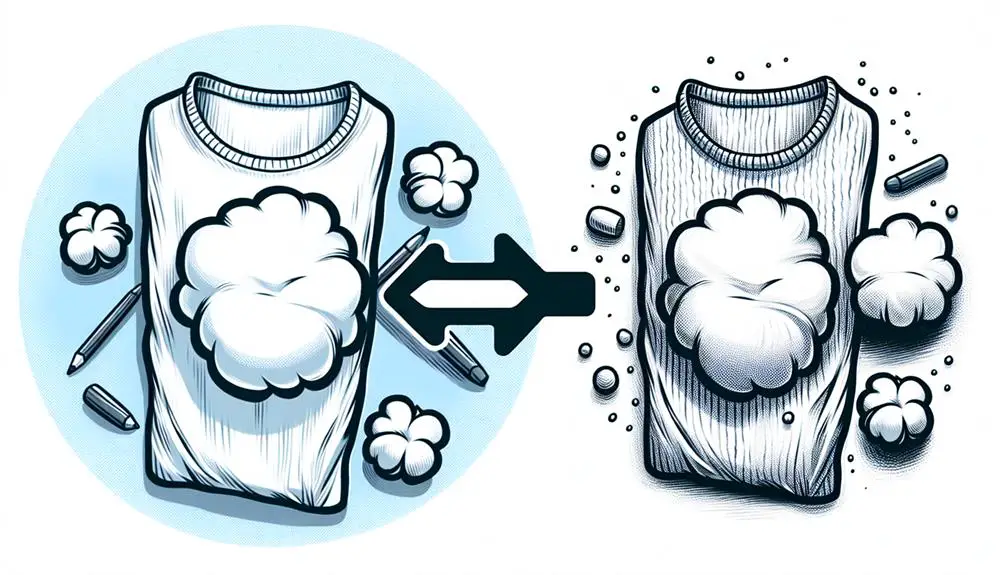Cotton is fantastic for being strong, breathable, and absorbent. It's also antibacterial and eco-friendly because it's biodegradable and sustainable. But hey, there are downsides too. It guzzles a lot of water and can harm the environment with farming practices. Want to know more about how cotton impacts our world? Keep exploring the info to uncover details on its care, environmental challenges, and sustainable alternatives.
Table of Contents
Key Takeaways
- Cotton is naturally strong, breathable, and absorbent.
- Cotton farming has high water consumption and environmental impact.
- Slow-drying nature and soil damage are disadvantages of cotton.
- Cotton care includes washing in cold water and avoiding harsh detergents.
- Sustainable alternatives like organic cotton reduce environmental impact.
Advantages of Cotton
Cotton, being a naturally strong and breathable fiber, offers numerous advantages that make it a popular choice for clothing. This natural fabric isn't only comfortable but also highly absorbent, making it ideal for various types of clothing. Its ability to soak up moisture makes it a go-to option for those looking for comfortable and breathable attire in all seasons. Additionally, cotton is anti-bacterial, which is a fantastic feature for clothing as it helps in keeping garments fresh for longer periods.
Moreover, cotton is sustainable and biodegradable, making it an environmentally friendly choice for those concerned about their ecological footprint. Its biodegradability guarantees that once discarded, cotton clothing will naturally decompose without harming the environment. Another notable advantage of cotton is its coolness; the fabric allows for proper air circulation, making it a preferred option for hot and humid climates. Overall, the natural properties of cotton make it a versatile and practical choice for a wide range of clothing items.
Disadvantages of Cotton
The environmental impact of conventional cotton farming practices is a pressing concern due to the heavy use of fertilizers and pesticides. Non-organic cotton production contributes to high water consumption, putting stress on water resources in cultivation areas.
Cotton's slow-drying nature can be a drawback when compared to synthetic fabrics, impacting its practicality in certain applications. Additionally, the environmental repercussions of non-organic cotton include damage to soil quality and harm to surrounding wildlife.
The use of chemical inputs in conventional cotton farming further exacerbates its negative effects on the environment. This not only affects the immediate ecosystem but also has broader implications for biodiversity.
Addressing these challenges is essential for sustainable cotton production and reducing its overall environmental footprint. By considering alternatives and implementing more eco-friendly practices, we can work towards mitigating the disadvantages associated with cotton cultivation.
Environmental Impact of Cotton Farming
Considering the environmental impact of cotton farming, it's important to acknowledge the significant use of pesticides and chemicals in conventional cultivation practices. Conventional cotton farming is known for its heavy reliance on pesticides and chemicals, which can have detrimental effects on the environment, including water pollution and biodiversity loss. Additionally, cotton cultivation is water-intensive, requiring a substantial amount of water to grow. This high water consumption can lead to soil degradation and erosion, further exacerbating environmental concerns. Furthermore, non-organic cotton farming contributes to greenhouse gas emissions and deforestation in certain regions.
To address these environmental issues, sustainable alternatives like organic cotton farming have been developed. Organic cotton farming aims to reduce the environmental impact of cotton production by avoiding the use of synthetic pesticides and chemicals, promoting soil health, and preserving biodiversity. By choosing organic cotton products, consumers can support more environmentally friendly practices in the textile industry and help mitigate the negative effects of conventional cotton farming on the environment.
Care and Maintenance of Cotton Clothes
When caring for cotton clothes, it's crucial to follow specific guidelines to guarantee their longevity and quality. To maintain the integrity of your cotton garments, wash them in cold water to prevent shrinking and color fading.
Harsh detergents should be avoided as they can compromise the softness and overall quality of the fabric. When drying, opt for a low heat setting or air dry to prevent excessive shrinkage. Ironing cotton pieces inside out will help preserve the color and prevent damage to the fabric.
Proper storage is key; keep cotton clothes in a cool, dry place to avoid mildew and ensure they remain fresh. By following these simple steps, you can prolong the life of your cotton garments and continue to enjoy their comfort and durability.
Sustainability Challenges in the Cotton Industry
Addressing sustainability challenges in the cotton industry requires a holistic approach that tackles environmental, social, and ethical concerns.
Conventional cotton production's high water consumption impacts water resources, leading to scarcity in cultivation areas. The use of pesticides and chemicals poses environmental risks and health concerns. Additionally, child labor and unethical practices are prevalent in the industry, highlighting social sustainability challenges.
Organic cotton provides a more sustainable alternative with reduced pesticide use, healthier farming practices, and lower environmental impact. Sustainable initiatives in the cotton sector aim to promote ethical sourcing, reduce chemical usage, and enhance transparency in the supply chain.
Embracing these practices can mitigate the harmful effects of conventional cotton production, fostering a more sustainable industry that prioritizes environmental preservation, social responsibility, and ethical standards. By supporting organic cotton and sustainable initiatives, we can contribute to a healthier planet and a more socially responsible cotton industry.
Frequently Asked Questions
What Are Advantages of Cotton?
Well, the advantages of cotton are numerous. It's strong, breathable, and comfortable. Plus, it's naturally anti-bacterial and highly absorbent. Cotton is a versatile material that's great for various clothing types, making it an excellent choice.
What Are Some Disadvantages of Cotton?
Well, some disadvantages of cotton include high water consumption in farming, potential environmental damage from pesticides and fertilizers, soil depletion, and the impact on wildlife. These factors contribute to the environmental and ethical concerns surrounding cotton production.
What Are the Pros and Cons of 100% Cotton?
Wearing 100% cotton is comfortable, breathable, and eco-friendly. It's great for all seasons and biodegradable. While it can shrink and wrinkle, the natural benefits make it a popular choice for versatile clothing.
What Are the Advantages and Disadvantages of Absorbent Cotton?
Absorbent cotton, with its exceptional liquid absorption and soft texture, is widely used in medical and hygiene products. Its versatility extends beyond these areas, offering benefits like gentle care for sensitive skin.
- Nonwoven Fabric for Masks: What Makes a Good Filter? - July 11, 2025
- A Practical Guide to Using Nonwoven Geotextiles - July 11, 2025
- Everything You Should Know About Nonwoven Wallpaper - July 11, 2025



